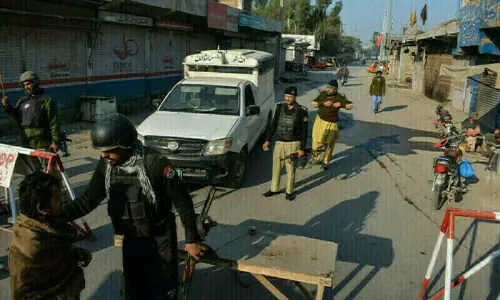Being a journalist in Pakistan is not an easy job.
Global rights organisations have rated the country as one of the most dangerous for journalists and an increasing number of reporters being killed in the last two years has made it the deadliest in the world.
It is not uncommon for a Pakistani journalist, or their family, to live under a constant cloud of fear and intimidation. Reporters working in the field have been allegedly threatened, abducted, tortured and killed by armed political groups as well as state and non-state actors.
Time and again, reporters covering topics deemed sensitive have been individually targeted in Pakistan. Saleem Shahzad – a Pakistani journalist who had complained of receiving threats from the state’s spy agency – was abducted, tortured and then murdered last May. Wali Khan Babar, a Geo News reporter, was allegedly killed in Karachi by a political party’s armed wing in January 2011.
“Journalists are being targeted with impunity and the government has failed miserably to check this dangerous trend,” the Pakistan Federal Union of Journalists (PFUJ) had said in a statement following Babar’s murder last year.
While authorities have yet to unmask the culprits behind Shahzad and Babar’s murders, the voices of dissent in the Pakistani press continue to be silenced. Earlier this year, the bullet-riddled body of another reporter, Razzaq Gul, was recovered from Turbat in the troubled province of Balochistan.
A new dilemma While journalists have always been under threat on the field, they now face a new challenge back at their news organisations’ headquarters.
On the night of June 25, 2012, four gunmen on motorcycles attacked the offices of a Karachi-based news channel, Aaj TV, located in one of the busiest parts of the city. With just two people wounded, this was neither the deadliest attack on media-men, nor the first time that the Aaj TV office had been hit by armed assailants.
The channel had faced a similar assault five years ago, but this fresh attack was different in nature as it unveiled a new dilemma for the media.
The Pakistani Taliban claimed responsibility for last week’s shooting on the office, claiming they had hit the channel for not giving full coverage to the Jihadi movement, and threatening further attacks on other media outlets that did not air the Taliban point of view.
The warning leaves media organisations caught between a rock and a hard place as they cover Pakistan’s war against militancy. An ordinance issued by Pemra, the government’s media regulatory body, prohibits news channels from accommodating the insurgents’ viewpoint, forbidding them from broadcasting “statements and pronouncements of militants and extremist elements.”
Ali Dayan Hasan, Director of Human Rights Watch (HRW) in Pakistan, calls the threat a “direct attack on media freedom.”
“We have seen repeated attacks on and threats to individual journalists by militant groups – particularly Al Qaeda and Taliban affiliates. However, the attack on Aaj TV is the first organised targeting of an entire media group with a view to coercing the industry into providing coverage more to the liking of the TTP. This is a direct attack on media freedom and is a chilling indication of how vulnerable journalists are not just in the field but now even in their offices and studios.”
Though the government was quick to condemn the incident, with the newly-elected prime minister issuing a statement the same night, some think the response was inadequate considering the attack was carried out against the industry and not just one organisation.
“There are two police vehicles now placed permanently outside our office, with Rangers personnel doing the rounds for further security,” says Rafiq Azad, a reporter for Aaj TV. “But, given this was an act of aggression not just against us but other news channels as well, this is not enough.”
“This was a sign of panic…an old tactic being reused by the terrorists to instill fear into the hearts and minds of the journalism community,” Information Minister Qamar Zaman Zaman Kaira told Dawn.com. “We condemn this and any such acts of terrorism. We have been in contact with some journalists’ bodies and associations, and the Pakistani government is willing to provide any sort of protection to the press.”
However, the response from journalists’ unions and associations was rather weak.
The attack also received little airplay on local media, compared to the international media’s coverage of the incident. A popular talk show aired the next day also focused on the same aspect.
“Unfortunately, what we saw was a backlash from other channels when reporting this incident. A few who did report [it] refrained from naming us or the Taliban, with some headlines calling it an ‘incident of firing at Gurumandir,’” complains reporter Rafiq Azad.
“Many elements of the media already present a Taliban-apologist narrative, as do many politicians, not just out of political sympathy but out of a desire for self-preservation,” says Hasan, the HRW’s country director. “[However], it is difficult to say whether the muted reaction to the attack on Aaj TV was a function of fear, incomprehension and indifference or a combination of all.”
“What is clear is that if the state allows recurrence of such attacks, it will have dangerous repercussions not just for the media but broader society as well,” says Hasan, who has also worked as a journalist in the past. “Unless addressed, this event is likely to have very serious consequences for both the security of media personnel and also media ethics. Unless journalists feel secure enough to report freely on the TTP, a level of self-censorship born of fear will be the very least of the issues that will arise.”
“Obviously, we are human beings…we are also part of the same society. We have families too. We, too, fear for our security,” says Azad. “But this is our job, this is what we do.”
The author is a multimedia journalist at Dawn.com.
































